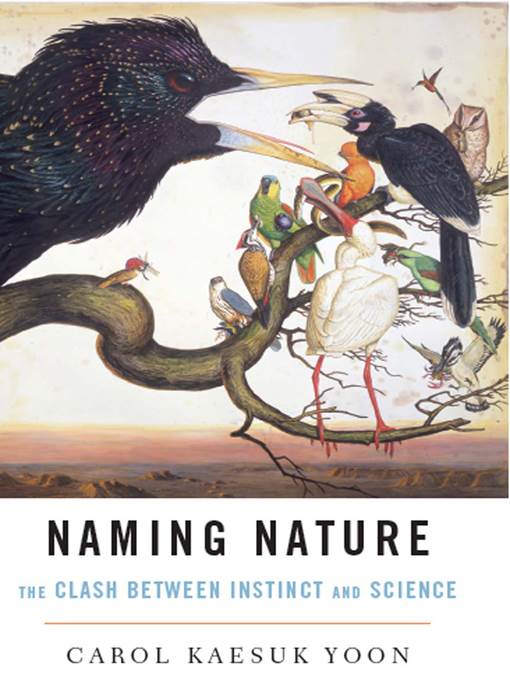
Naming Nature
The Clash Between Instinct and Science
- اطلاعات
- نقد و بررسی
- دیدگاه کاربران
نقد و بررسی

Starred review from April 13, 2009
In this entertaining and insightful book, New York Times
science writer Yoon sets out to document the progression of the scientific “quest to order and name the entire living world—the whole squawking, scuttling, blooming, twining, leafy, furry, green and wondrous mess of it” from Linnaeus to present-day taxonomists. But her initial assumption of science as the ultimate authority is sideswiped by her growing interest in umwelt
, how animals perceive the world in a way “idiosyncratic to each species, fueled by its particular sensory and cognitive powers and limited by its deficits.” According to Yoon, Linnaeus was an umwelt
prodigy, but as taxonomists began to abandon the senses and use microscopic evidence and DNA to trace evolutionary relations, nonscientists' gave up their brain-given right (and tendency) to order the living world, with the devastating result of becoming indifferent to the current mass extinctions. Yoon's invitation for laypeople to reclaim their umwelt
, to “take one step closer to the living world” and accept as valid the “wondrous variety in the ordering of life,” is optimistic, exhilarating and revolutionary.

Starred review from June 15, 2009
New York Times"Science Times" writer Yoon debuts with a wondrous history of taxonomy—the science of ordering and naming living things—and how it has disconnected us from the natural world.
As she lucidly describes how different cultures have named plants and animals through history, the author uncovers the sharp disjuncture between folk taxonomy—the similar, appearance-based ways in which ordinary people have always named living things—and the science of classification, which has dominated our thinking about nature since Carl Linnaeus, the Swedish botanist and author of Systema Naturae (1735), set the rule that every species must have a two-part name, or Latin binomial. Yoon traces the rise of various schools of scientific taxonomy—evolutionary, numerical and molecular—each of which emphasizes different factors of classifying living things. She also examines the work of leading figures in the field, from the German ornithologist Ernst Mayr to Austrian biologist Robert Sokal, and describes the near-rabid infighting over methodology. Against all of this she posits the power of the human umwelt (a German word for the environment or"surrounding world"), a hard-wired way of perceiving the living world that has allowed humans since the ancient hunter-gatherers to recognize things and survive. The umwelt, writes the author, accounts for the fact that different cultures give similar names, such as fish, to wildlife—and has long served as humanity's most intimate connection to the natural world. By bowing to the rationality of a scientific view of the natural order, we have undermined our understanding of the world. Yoon's accounts of brain-damaged individuals who cannot recognize and name living things—and of young children's unquenchable interest, even before they can walk or talk, in the natural world—bring to life the marvel of our intuitive umwelt abilities. We must cling to these abilities if we are to preserve nature, the author argues. Brightly blending scientific expertise with personal experience, Yoon is an outstanding science writer who takes a seemingly dull topic and rivets unsuspecting readers to the page.
Superb.
(COPYRIGHT (2009) KIRKUS REVIEWS/NIELSEN BUSINESS MEDIA, INC. ALL RIGHTS RESERVED.)

June 1, 2009
Yoon, a "New York Times" science journalist, writes about the human need to name and classify living things in our perceived worldshe uses the term "umwelt" (from the German "Umwelt", enivronment) to describe our environment. Anthropologists have found that similar taxonomies are created no matter what culture, language, or age group is studied. This suggests that there is a part of the brain devoted to naming things, and Yoon describes studies showing that the part of the brain that names living things is different from the part of the brain that names inanimate or human-made objects. Yoon argues that as we move away from traditional taxonomies toward more scientific evolution or gene-based taxonomies, we begin to lose part of who we are. VERDICT Rob R. Dunn's "Every Living Thing" also covers taxonomy, but as well as addressing Carl Linnaeus, it discusses new species and the people who classify and name them, rather than the human instinct to name species. Given the specialty of the topic, Yoon's work may attract educated lay readers interested in cognitive science, the origin of words, and natural history.Margaret Henderson, Tompkins-McCaw Lib., Virginia Commonwealth Univ., Richmond
Copyright 2009 Library Journal, LLC Used with permission.

July 1, 2009
When ecologist and science writer Yoon set out to write this book, she was intending to produce a history of how scientists name the living things that share our planet. This classification, the science of taxonomy, was to be shown as the superior method for ordering and giving names to the natural world. But in the process of comparing science with the historical classifications of other cultures, such as the Maya or ancient Chinese, or by the natural ordering of the living world that all children are adept at, Yoon discovered that the ability and desire to name and order living things is innate. This is the umwelt, the way in which any organism perceives the world through its senses and its powers of cognition. The human umwelt causes us to perceive the order in the living world around us and connects us to that world and our place within it. Beginning with Carl Linnaeus, founder of the science of taxonomy, Yoon wanders a path that leads through Darwin. Impossible to put down.(Reprinted with permission of Booklist, copyright 2009, American Library Association.)




دیدگاه کاربران